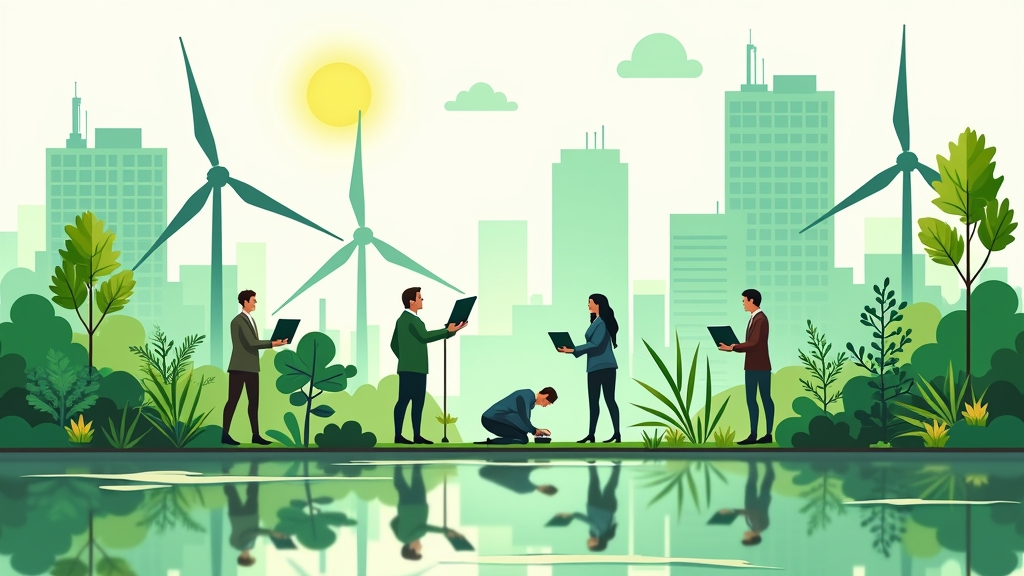advertising
Green Jobs: How to Join the Sustainable Economy
What are green jobs and why are they on the rise?
Have you ever stopped to think about how the job market is changing to meet environmental challenges? The green job vacancies are those that contribute directly to preserving the environment, reducing carbon emissions and promoting sustainable practices. They are on the rise because companies and governments are increasingly under pressure to adopt planet-friendly business models.
But make no mistake: these opportunities are not limited to obvious areas such as solar energy or recycling. Marketing, engineering, finance and even IT professionals are being asked to develop sustainable solutions. A data analyst, for example, can work on optimizing energy consumption in large corporations. A designer can create biodegradable packaging. The possibilities are vast!
advertising
According to the International Labor Organization (ILO), by 2030, more than 24 million jobs will be created globally thanks to the green economy. This means that if you're looking for a career with purpose and a future, this is the way to go. How about starting to prepare now?
To delve deeper, it's worth exploring reports such as the ILO's on green jobs. There you'll find up-to-date data and market trends.
What are the main areas of activity in the sustainable economy?
If you think that working with sustainability only means planting trees or installing solar panels, it's time to broaden your horizon. The green economy encompasses diverse sectors, from regenerative agriculture to clean technology. Shall we explore some of the most promising areas?
In the renewable energyEngineers, technicians and managers are essential for operating wind farms, solar plants and biomass projects. Companies like Iberdrola and Engie are constantly hiring qualified professionals.
In sustainable constructionArchitects and engineers specializing in certifications such as LEED and AQUA are highly valued. They design buildings that consume less water and energy, using recycled materials and innovative techniques.
Another growing field is agroecologicalwhere farmers, biologists and agronomists develop crops without pesticides, promoting food security and biodiversity. Companies such as Natura invest heavily in this area, looking for suppliers that adopt sustainable practices.
And we mustn't forget green financial market. Banks and investment funds are creating products such as green bonds and credit lines for environmental projects. A financial analyst with knowledge of ESG (Environmental, Social, and Governance) has a huge competitive edge.
What skills and training are needed to enter this market?
If you're thinking of switching to a sustainable economy, you may be wondering: "Do I need to go to a new university?" The answer is: it depends. Some areas require specific training, such as environmental engineering or agronomy, but many skills can be acquired through complementary courses and practical experience.
One of the most valued skills is ESG knowledge. If you work in administration, law or finance, a certification like the CFA ESG Investing can open doors. Communications and marketing professionals can also stand out by learning about corporate sustainability and green storytelling.
For those who prefer the technical area, courses in photovoltaic solar energy, waste management or energy efficiency are great investments. Platforms such as Coursera offer internationally recognized programs.
But beyond technical knowledge, soft skills such as creativity, resilience and the ability to innovate are fundamental. After all, many sustainability challenges require out-of-the-box solutions. Are you prepared to think differently?
How to find green jobs in Brazil and around the world?
Now that you know what skills to develop, it's time to look for opportunities. But where to look? Fortunately, there are platforms specializing in sustainable jobs, as well as trainee programs and specific calls for proposals.

In Brazil, sites such as InfoJobs and LinkedIn often list vacancies in companies with a focus on sustainability. Large corporations such as Ambev and Itaú have recruitment programs for professionals aligned with their ESG goals.
If your goal is to work abroad, platforms such as GreenJobs It is Idealist concentrate job offers in environmental organizations and green startups. Countries like Germany, Canada and the Netherlands are particularly active in this market.
Another strategy is to take part in industry fairs and eventsThe event is a great place for networking, such as Green Rio and Expo Sustentabilidade. These spaces are great for networking and can lead to opportunities that are not publicly disclosed. Have you thought about attending the next event in the area?
How to stand out in the selection process for a green job?
Getting an interview is just the first step. To really stand out, you need to show alignment with company values and demonstrate how their skills solve real problems. But how do you do that?
Start by researching the organization thoroughly. What are its commitments to sustainability? What projects has it already implemented? Include in your CV and cover letter concrete examples how you have contributed to green initiatives, even on a small scale.
During the interview, use practical cases. If you worked on a waste reduction project at a previous company, explain the results in figures. Show that you don't just talk about sustainability, but age according to her.
And don't underestimate the power of volunteering. Taking part in actions such as reforestation efforts or recycling campaigns can enrich your CV and prove your commitment. How about finding a local NGO to get started?
What are the challenges of working in a sustainable economy?
Despite the many opportunities, the transition to a green career is not without its obstacles. One of the biggest challenges is lack of clear regulations in some sectors, which can lead to instability. In addition, many companies still see sustainability as a cost, not an investment.
Another point is competition. As the market is booming, qualified professionals are competing for the same jobs. That's why specializing in specific niches, such as carbon offset or reverse logisticsThis could be a smart move.
And we can't ignore the pressure for results. Working with sustainability often means convincing skeptical stakeholders and proving that the proposed changes bring financial returns. Are you ready for this challenge?
How do you keep up to date and grow in your green career?
The sustainable economy is constantly evolving, and standing still is not an option. Read annual reports such as Global Trends in Renewable Energy Investment and follow portals such as World Green Building Council helps to understand trends.
Participate in refresher courses It is postgraduate courses is also essential. Institutions such as Sustainability offer advanced programs in environmental management and corporate responsibility.
Finally, build a solid network of contacts. LinkedIn groups, professional associations and mentors can accelerate your trajectory. After all, who says saving the planet can't also be a promising career?
So, are you ready to take the first step? The future is green, and it starts now. 🌱



